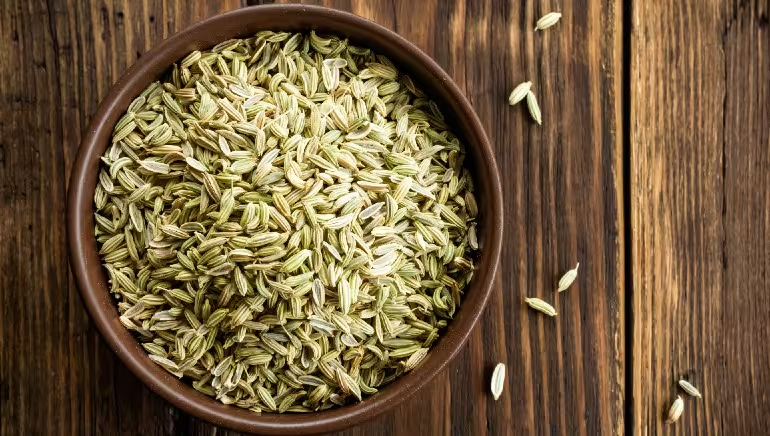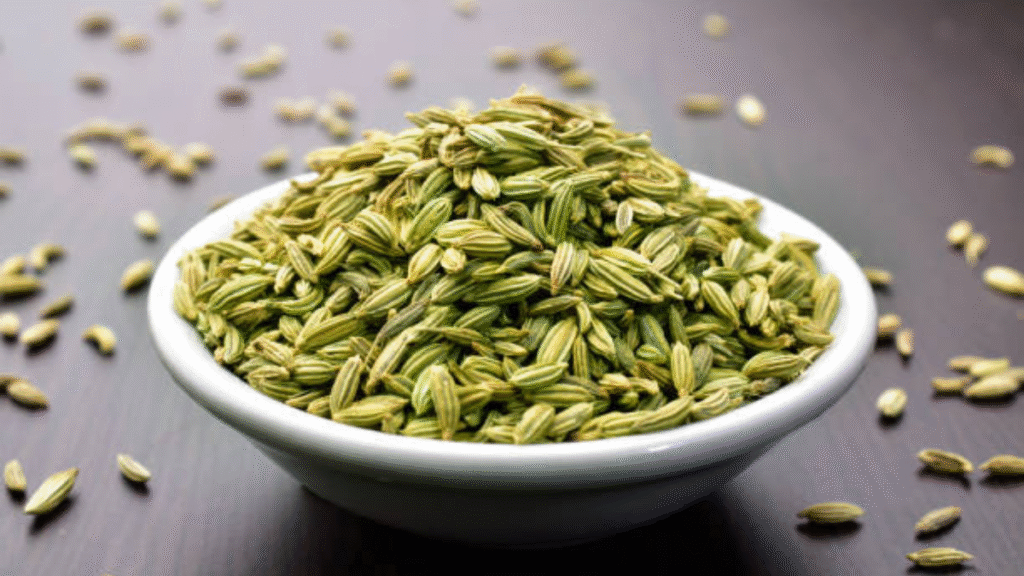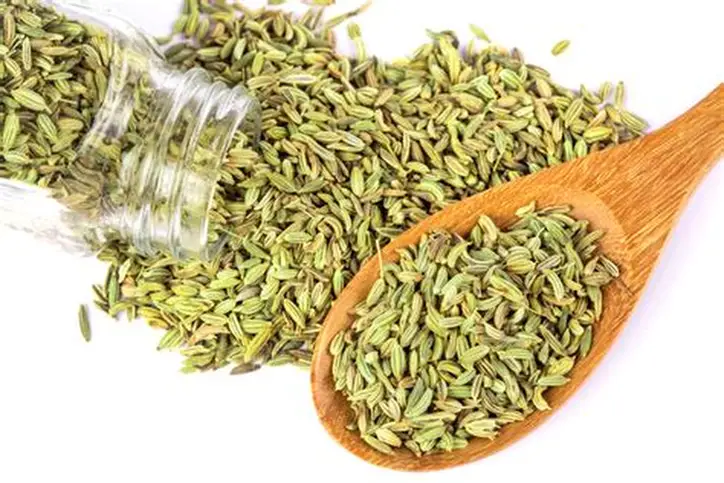Introduction
Common fennel (Foeniculum vulgare) has been used in traditional and conventional healthcare systems like Ayurveda, Unani, and Traditional Chinese Medicine for countless ages. The fennel seeds are known not only for their sweet aroma but also for their cool taste, which is often chewed after meals to aid in digestion and freshen the breath. Apart from being used in cooking, folklores suggest the use of fennel seeds for good health, predominantly with reference to the digestive, urinary, and renal systems of the body.
The question remains: Is fennel seed good for kidney health? Will it help protect the kidney, help prevent kidney infections, or reduce the risk for kidney stones? Or is it just the promise of old wives with no sound scientific backup?
The article will provide a detailed study of the nutrients present in fennel seeds and its conventional uses, scientific studies, and their probable role in its support of kidney health.
Nutrients Found in Fennel Seeds

A tablespoon of fennel seeds, weighing around 6 grams, contains the following nutrients:
- Calories: 20
- Fiber: 2 g
- Vitamin C: 5% of your daily intake
- Potassium: 3% of your daily intake
- Calcium, Magnesium, Manganese: These trace, but important, minerals are present in moderate amounts.
- Antioxidants: flavonoids, quercetin, and phenolic compounds
- Essential oils: anethole, fenchone, limonene
These nutrients give fennel seeds a diuretic, anti-inflammatory, and antioxidant effect and make them especially beneficial for the kidneys and urinary system.
How Fennel Seeds Can Aid Kidney Health
- Acts As a Diuretic
Arguably, fennel seeds aid in the increased excretion of urine because of their well-known diuretic properties, which in turn draw out excess salts and some amount of toxins in the urine…
- Aids in the prevention of Kidney Stones
Kidney stones occur due to accumulation of calcium, oxalates, and uric acids. Simply put, fennel seeds might hinder the formation of stones by maintaining superior fluid regulation and thus also flushing any particles out before they crystallize.
- Antidote for Detoxification
Kidneys act as a natural filter of the body. The antioxidants from fennel seeds fight against free radicals that might cause oxidative damage in the kidney cells.

- Provide Relief from Urinary Tract Infections (UTIs)
Fennel seeds contain mild antibacterial properties, so they might help reduce the severity of UTIs. UTI, untreated, might lead to a kidney infection.
- Regulation of Blood Pressure
High blood pressure is the most prominent risk factor for kidney disease. Given that fennel seeds contain potassium, they should benefit the kidneys, especially if interlinked with maintaining sodium balance.
- Anti-inflammatory
Chronic inflammation is closely associated with the progression of kidney disease. Some of the components in fennel seeds, such as anethole, suppress inflammation and protect renal tissues.
Research on Fennel Seeds and Kidneys
Although traditional medicine has recognized cauliflower seeds for some characteristics, the modern approach is still new.
Some studies attest to fennel’s diuretic nature and antioxidants, and are far from being termed as large-scale clinical tests.
- In 2018, a study published in the Journal of Food Biochemistry showed that fennel extracts offer protection against oxidative damage to the kidneys in rats.
- Another short-duration study also showed that fennel tea helped increase urinary output and relieved symptoms in patients with lower-grade urinary issues.
- Ayurveda uses fennel for mutrakriccha, or urinary disorders, attributing these effects to its cooling, soothing, and detoxifying abilities…
- Although evidence is encouraging, more human research is required to establish fennel seeds as a definitive remedy for improving kidney health.
Other Medicinal Benefits from Fennel Seeds

Some of the benefits of leading the field include:
- Better Digestion: Reducing bloating, gas, and indigestion.
- Fresh Breath: Natural Breath Freshener.
- Boosts Defense System: Vitamin C and antioxidants.
- Hormone Level Harmonizing: Phytoestrogens—women’s welfare-promoting constituents.
- Weight Management: High in fiber and insulin suppressors.
- Cardiovascular System: Potassium, as present in fennel, helps keep blood pressure under control.
Risks and Side Effects
While fennel seeds are largely considered safe, excessive consumption can result in the following:
- Allergic reactions in those easily sensitive to the celery family plants or plants like carrots.
- A characteristic of fennel is its phytoestrogenic content. For those with conditions caused by hormones…
- Fennel seed tea or extract should be avoided by pregnant or nursing women, as well as those with personal or familial hormonal problems.
Ultimately, despite all the benefits provided by fennel seeds, it is recommended that individuals with a preponderance of kidney disease or some other health status that requires drugs consult with their doctors before considering the potential efficacy of consuming fennel seeds as dietary supplements.
How to use fennel seeds for kidney health
- Fennikelvann: Soft 1 teaspoon of fennel seeds in warm water overnight and drink in the morning.
- Fennel: Boil fennel seeds in water, drink for stress and soothing effects.
- Chewing Seeds: Just chew a spoonful after meals.
- Fennel powder: Mix powder fennel in chush, curd, or herbal drinks.
- Moderation is the key – 1-2 teaspoons per day are generally safe and favorable.
Do fennel seeds really keep the kidneys healthy?
Answer: Yes, but with boundaries.
Fennel seeds support renal health by rinsing toxins, reducing inflammation, and preventing urinary infection. However, they are not a cure for serious kidney diseases. Instead, they act as a balanced diet, hygiene, exercise, and medical treatment as an aid.

Conclusion
Fennel seeds are more than just a spice – they are a natural remedy for digestion, depression, and kidney support. Their diuretic and antioxidant properties give them a valuable role in -healthy lifestyle.
But without assessing the general diet, hydration, and medical advice, it would be unfulfilling to rely just fennel seeds. Think of fennel, not a thinner. If used properly and in moderation, fennel seeds can actually play a role in maintaining renal health and reducing the risk of normal urine problems.
Although fennel seeds cannot completely prevent kidney disease, they can definitely support better kidney function and help keep your kidney system clean and balanced.
FAQs:
Can fennel seeds cure kidney disease?
No, fennel seeds cannot cure kidney disease but they may support kidney health by reducing toxins, inflammation, and urinary discomfort.
Are fennel seeds safe for kidney stone patients?
Yes, fennel seeds may help prevent further stone formation due to their diuretic effect, but consult a doctor before daily use.
How much fennel seed water should I drink daily for kidney health?
One glass made from soaking or boiling 1 teaspoon fennel seeds is sufficient for most people to support kidney function.
Can fennel seeds interact with kidney medications?
Yes, fennel seeds may interact with blood thinners, antibiotics, or diuretics. Always consult your doctor if on long-term medications.
Medical Disclaimer
The information provided on Health Tips India is intended for educational and informational purposes only. It should not be considered a substitute for professional medical advice, diagnosis, or treatment.
Always consult a qualified healthcare professional before making any health-related decisions or changes to your diet, exercise, or medical routine.
SamhithaHealth & Wellness Content Writer
a Health & Wellness Content Writer with over 6 years of experience creating research-based health articles. She specializes in nutrition, weight management, diabetes care, skin health, and healthy lifestyle practices. Here content is carefully written using trusted medical and scientific sources to ensure accuracy and clarity for readers.

